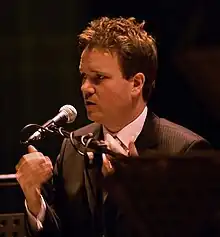In Christ Alone
"In Christ Alone" is a popular modern Christian song written by Keith Getty and Stuart Townend, both songwriters of Christian hymns and contemporary worship music in the United Kingdom. The song, with a strong Irish melody, is the first hymn they penned together.[1][2] The music was by Getty and the original lyrics by Townend. It was composed in 2001.
| In Christ Alone | |
|---|---|
| by Keith Getty | |
| Genre | Contemporary Christian hymn |
| Written | 2001 |
| Text | Stuart Townend |
| Meter | 8.8.8.8 D |
| Melody | "In Christ Alone" |

"In Christ Alone" is considered a Christian credal song for belief in Jesus Christ. The theme of the song is the life, death and resurrection of Christ,[3] and that he is God whom even death cannot hold.
The song is commonly known as "In Christ Alone (My Hope Is Found)" and "In Christ Alone (I Stand)" taking verses from the song. It has become very popular and has been the subject of many cover versions[4] and many language translations.
The Getty/Townend song should not be confused with the similarly titled song "In Christ Alone" co-written by Don Koch and Shawn Craig, originally recorded by Michael English on his self-titled debut solo album Michael English, and many others.
Popularity

The song was composed in 2001 and gained increased popularity first in Ireland and the UK and then in the United States and internationally. In 2002, Stuart Townend, the lyricist of the song, recorded it on his own album Lord of Every Heart[5] By 2005, it had been named by a BBC Songs of Praise survey as the ninth best-loved hymn of all time in the UK and then third in the same poll by the show in 2019;[6] By 2006, it rose to the No. 1 position on the United Kingdom CCLI (Christian Copyright Licensing International) charts.[7] "In Christ Alone" appeared on CCLI's "Top 25 CCLI Songs" American songs list for the first time in the February 2008 report although it had appeared in the CCLI chart for Canada, Australia and New Zealand prior to that.
In 2008, the song was included in the release of Christian Worship: Supplement for the Wisconsin Evangelical Lutheran Synod (WELS).[8] In 2015, the song was listed among the "Fifty Favorite Hymns" in a WELS survey.[9][10]
In 2010, Owl City's Adam Young recorded a version and offered it through his blog. About the song, he wrote: "I'm twenty-four years old, yet something about this song makes me bawl like a baby. The way the melodies and lyrics swirl together is so poignant and beautiful. If I were to count on one hand, the number of songs that have ever deeply moved me, this one would take the cake. Last night I probably spent more time actually crying at the piano than I did recording it. Such are the secret confessions of a shy boy from Minnesota".[11]
In 2013, the song was sung at the enthronement of Justin Welby as Archbishop of Canterbury.[12] Also in this year, a new bridge section was added to the song by Kristian Stanfill and included in the live Passion: Let the Future Begin recording.
In 2015, Julien Baker played a portion of the piano melody from In Christ Alone at the end of "Go Home" on her album Sprained Ankle. Baker later said about the song: "It holds a lot of memories for me—being young in church, and the lyrics hold a lot of meaning when you analyze them."[13]
Theological debate
The second verse of the hymn contains the line, "Till on that cross as Jesus died, the wrath of God was satisfied," which adheres to the satisfaction theory of atonement. This line has hence made the song a subject of criticism by opponents of satisfaction theory. In 2013, a 15-member committee of the Presbyterian Church (USA) voted to exclude the song from a new church hymnal after Townend and Getty refused permission to alter the controversial line to "the love of God was magnified."[14][15] Members of the committee to compile the hymnal had discovered the alternate lyrics in a Baptist hymnal from 2010, causing them to assume that the change had been authorized by the copyright holders.[14] Critics of the committee's decision pointed out that the hymnal included other hymns endorsing satisfaction theory and the substitutionary model of atonement, including "O Sacred Head Now Wounded."[14] According to committee chair Mary Louise Bringle, the decision to exclude "In Christ Alone" centered not on the word "wrath" but rather on "satisfied."[14]
The committee's decision to exclude the song triggered a larger debate across denominations and within the Presbyterian Church USA itself. PCUSA minister Chris Joiner of First said that while many in his congregation liked the hymn, he agreed with the decision because "that lyric comes close to saying that God killed Jesus. The cross is not an instrument of God's wrath."[14] Timothy George, the dean of Beeson Divinity School, criticized the decision in an online column titled "No Squishy Love" and claimed that it "fits into a wider pattern of downplaying parts of Christian doctrine that are offensive."[16] Boyce College professor Denny Burk took a view similar to George, stating that "When wrath goes, so does the central meaning of the atonement of God: penal substitution. At the end of the day, the cross itself is the stumbling block, and that is why the PCUSA cannot abide by this hymn."[17] Meanwhile, Bob Terry of The Alabama Baptist wrote that he agreed with satisfaction theory, but "if the meaning of 'wrath' is that God is vindictive and took joy in punishing His Son then that is not how I find God described in the Bible. As I understand the Bible, it was because 'God so loved the world' that He was willing 'to crush Him and cause Him to suffer.'"[18]
References
- "In Christ Alone". Gettymusic.com. Archived from the original on 14 April 2012. Retrieved 7 March 2012.
- "Songfacts: In Christ Alone by Newsboys". Songfacts.com. Retrieved 7 March 2012.
- "In Christ Alone". Stuarttownend.co.uk. Retrieved 7 March 2012.
- Akins, Debra (22 July 2004). "Debra Akins in Crosswalk.com: Song Story - "In Christ Alone"". Crosswalk.com. Salem Web Network. Retrieved 7 March 2012.
- "Lord of Every Heart—Audio CD". Amazon. Retrieved 4 February 2013.
- "BBC Songs of Praise". BBC. Archived from the original on 18 July 2008. Retrieved 8 March 2012.
- "CCLI Top 25 Songs". CCLI. Archived from the original on 8 March 2012. Retrieved 8 March 2012.
- "Christian Worship: supplement".
- "In Christ Alone".
- "Fifty Favorites" (PDF).
- Young, Adam (25 October 2010). "In Christ Alone". Owlcityblog.com. Archived from the original on 28 March 2012. Retrieved 7 March 2012.
- "THE INAUGURATION OF THE MINISTRY OF THE ONE HUNDRED AND FIFTH ARCHBISHOP OF CANTERBURY: JUSTIN PORTAL WELBY" (PDF). Archbishopofcanterbury.org. 21 March 2013. Retrieved 29 July 2015.
- "An Interview With Young Phenom Julien Baker". 26 October 2015. Retrieved 22 January 2018.
- Smietana, Bob (5 August 2013). "Presbyterians' decision to drop hymn stirs debate". USA Today.
- Bringle, Mary Louise (1 May 2013). "Debating hymns". The Christian Century. Retrieved 9 August 2013.
- George, Timothy. "No Swishy Love". First Things. Retrieved 12 April 2020.
- "'In Christ Alone' worship hymn too controversial for new hymnal". Christian Examiner. 14 August 2013. Retrieved 7 July 2018.
- "The Alabama Baptist - A Resource for Christian Living". www.thealabamabaptist.org. Archived from the original on 16 August 2013. Retrieved 12 January 2022.